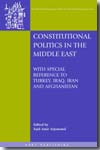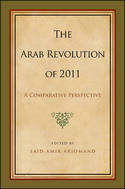Constitutional politics in the Middle East
with special reference to Turkey, Iraq, Iran and Afghanistan
- ISBN: 9781841137735
- Editorial: Hart Publishing
- Fecha de la edición: 2008
- Lugar de la edición: Oxford. Reino Unido
- Colección: The Oñati International Institute for the sociology of Law
- Encuadernación: Rústica
- Medidas: 24 cm
- Nº Pág.: 207
- Idiomas: Inglés

This is the first comparative and interdisciplinary study of constitutional politics and constitution- making in the Middle East. This innovative study provides an up-to-date analysis of the political and constitutional struggles in the Middle East. It is an important and topical issue that will be of interest to Middle East and policy specialists, political scientists and those concerned with constitutional studies. The publication of this book comes at an important time and the contributions, from leading specialists, add valuable insight into how political systems are constructed and reformed.The historical background and setting are fully explored in two substantial essays by Linda Darling and Said Amir Arjomand, placing the contemporary experience in the contexts, respectively, of the ancient Middle Eastern legal and political tradition and of the nineteenth and twentieth century legal codification and political modernization. These are followed by Ann Mayer's general analysis of the treatment of human rights in relation to Islam in Middle Eastern constitutions, and Nathan Brown's comparative scrutiny of the process of constitution-making in Iran, Afghanistan and Iraq with reference to the available constitutional theories which are shown to throw little or no light on it. The remaining essays are country by country case studies of Turkey, Afghanistan and Iraq, the case of Iran having been covered by Arjomand as the special point of reference.Mehmet Fevzi Bilgin examines the making and subsequent transformation of the Turkish Constitution of 1982 against current theories of constitutional and deliberative democracy, while Hootan Shambayati examines the institutional mechanism for protecting the ideological foundations of the Turkish Republic, most notably the Turkish Constitutional Court which offers a surprising parallel to the Iranian Council of Guardians. Arjomand's introduction brings together the bumpy experience of the Middle East along the long road to p







